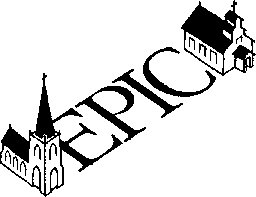The P in EPIC
All looked to the preacher/pastor. He was the final arbiter on all theological questions.
The preacher/pastor was bumped off the authority stool as education spreads through western society. Individualism grows.
With the spread of wealth, entertainment ushers in a consumer society. The spiritual by-product is a presentation/consumer/seeker movement among churches.
A cultural tsunami begins to force and spread change through the institutions of western culture; while, at the same time, sifting the weak and the strong.
Churches are forced to retool
There is a Major shift in mission: from crossing foreign boundaries to the mission field at home - a particularly difficult mission field.
There continues to be a shift in the gatherings of faith communities (the rate of understanding and change seems to be geographically dependent). The Major shift will continue to be from a Presentation to Participatory format.
Douglas Rushkoff in his soon to be released book, Get Back in the Box, says:
…businesses are inviting participation - from Adobe inviting users to create plugins via their "Studio Exchange" website, to John Fleuvog soliciting shoe designs from his customers. Those who are confident in their own core competency have nothing to fear from employees or customers with good ideas.
The market for products enabling the do-it-yourselfer is still growing. Home Depot and Lowe's equip the consumer with professional grade tools, while Vitamin Warehouse and herb shops supply the self-healer. Amateurs are now more responsible for formerly expert-only aspects of their own lives, and they're comfortable with it. The "no user serviceable parts" warning on the back of a radio or TV set is now taken as a challenge.
It's pure renaissance. Like gamers learning to play, then use cheat codes, and then finally program for themselves, people feel they can be trusted with the code. And they are willing to go ahead and do the hard work of learning it if they feel they can improve upon what already exists…
This renaissance ethos of authorship isn't limited to some isolated group of “cultural creatives” in New York, San Francisco, and Cambridge. No, it's a mainstream "red state" American trend, as well, emerging as crafts fairs, a NASCAR culture of car modification, gun kits, backyard farming, and even home schooling. For every Northeasterner musing on how he would have drawn up the plans for New York's street grid to include bike lanes (and then working through the city council to create some) there's a Midwesterner challenging the curriculum of the local school system, and rewriting his own version based on the facts and values he thinks are more important to teach a young person.
Churches that do cultural math early begin the process of change by extrapolation. This shortens the time and decreases the pain-intensity that always accompanies change within a community.

The majority of churches will allow the natural transitional path to be the itinerary for change. But reactive churches increase both the intensity and time a church struggles with transitional pain. This type of pain (acute) can lead to chronic and unforgiving hurt among members, which can mean a loss of members.




1 Comments:
Have you posted on E I or C yet?
Post a Comment
<< Home